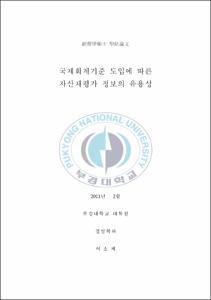국제회계기준 도입에 따른 자산재평가 정보의 유용성
- Abstract
- The Korea Accounting Standards Board(KASB) had enacted the Korean International Financial Reporting Standards(K-IFRS) and promulgated also on November, 2007. In accordance with this adoption, new set of standards will be of general applications in Korea. K-IFRS will be applied on listed companies only in the stock market from 2011 in advance, provided that early application will be permitted upon the option of companies from 2009, if want.
Since the abolition of a Property Revaluation System(PRS), any portion of property value increased had not been still adjusted in spite of all the difficulties of enterprises owing to the severe financial loss due to radical change of recent exchange rates. This is the very reason why PRS is considered and adopted again. We will apply IFRS on tangible assets first from 2011 to improve the ratio of debt to equity and other financial indices of enterprise.
The object of this study is to verify the reference variables which may influence to the stock value in connection with the revaluation of property which influence financial indices of company. For the analysis based on actual proof, we investigated financial data of 73 companies of which the result of the revaluation of property had been already announced publicly. Those 73 companies were selected among the listed companies in Korean Stock Market. and all of them had revaluated their property also.
In order to analyze whether such data from 73 companies has an actual effect on stock market or not after the result of revaluation of property is public announced, we had accumulated the exceeding benefit ratio of everyday during the investigating period and used this accumulated ratio as dependent variable. As the result of this study, the accumulation of exceeding benefit ratio of the company during the period of ten days before and after the revaluation of property, has no effect on stock market in connection with the return on assets, ratio of debt to equity, capital-adequacy ratio but has a minus effect on stock market in connection with the net income ratio on assets, asset turnover. Therefor we assumed as follows; Hypothesis 1)
We rejected the assumption that the data about revaluation of property conform to the IFRS have an plus effect on earnings rate of stock. It is confirmed that earnings rate of revaluation have an plus effect on earnings rate of stock. Hypothesis 2)
We adopted assumption that the Earnings rate of revaluation may have an plus effect on earnings rate of stock. As the conclusion of this study, we find that the data about revaluation of property has influence to the additional benefit ratio.
Therefor we confirmed that the data value about revaluation of property is reflected enough.
Meanwhile in the case of study for the evaluation of company value model, it is confirmed that revaluation reserve is an effective factor to the revaluation of property. It suggests that the data about revaluation of property is useful information to investors.
- Issued Date
- 2011
- Awarded Date
- 2011. 2
- Type
- Dissertation
- Publisher
- 부경대학교
- Affiliation
- 부경대학교 일반대학원
- Department
- 대학원 경영학과
- Advisor
- 김진황
- Table Of Contents
- 제 1 장 서론 1
제 2 장 이론적 배경과 선행연구 고찰 3
제 1 절 IFRS도입과 자산재평가 3
제 2 절 자산재평가제도 및 유형 자산 평가 4
제 3 절 선행연구 고찰 12
제 3 장 실증분석을 위한 연구설계 22
제 1 절 연구가설의 설정 23
제 2 절 변수의 정의 24
제 3 절 표본의 선정 28
제 4 절 연구모형 30
제 4 장 실증분석 결과 31
제 1 절 변수의 기술통계 분석 31
제 2 절 주요 변수의 상관관계 분석 31
제 3 절 종속변수의 t-검정 33
제 4 절 회귀분석 결과 35
제 5 장 결론 37
39
- Degree
- Master
- Files in This Item:
-
-
Download
 국제회계기준 도입에 따른 자산재평가 정보의 유용성.pdf
기타 데이터 / 413.37 kB / Adobe PDF
국제회계기준 도입에 따른 자산재평가 정보의 유용성.pdf
기타 데이터 / 413.37 kB / Adobe PDF
-
Items in Repository are protected by copyright, with all rights reserved, unless otherwise indicated.